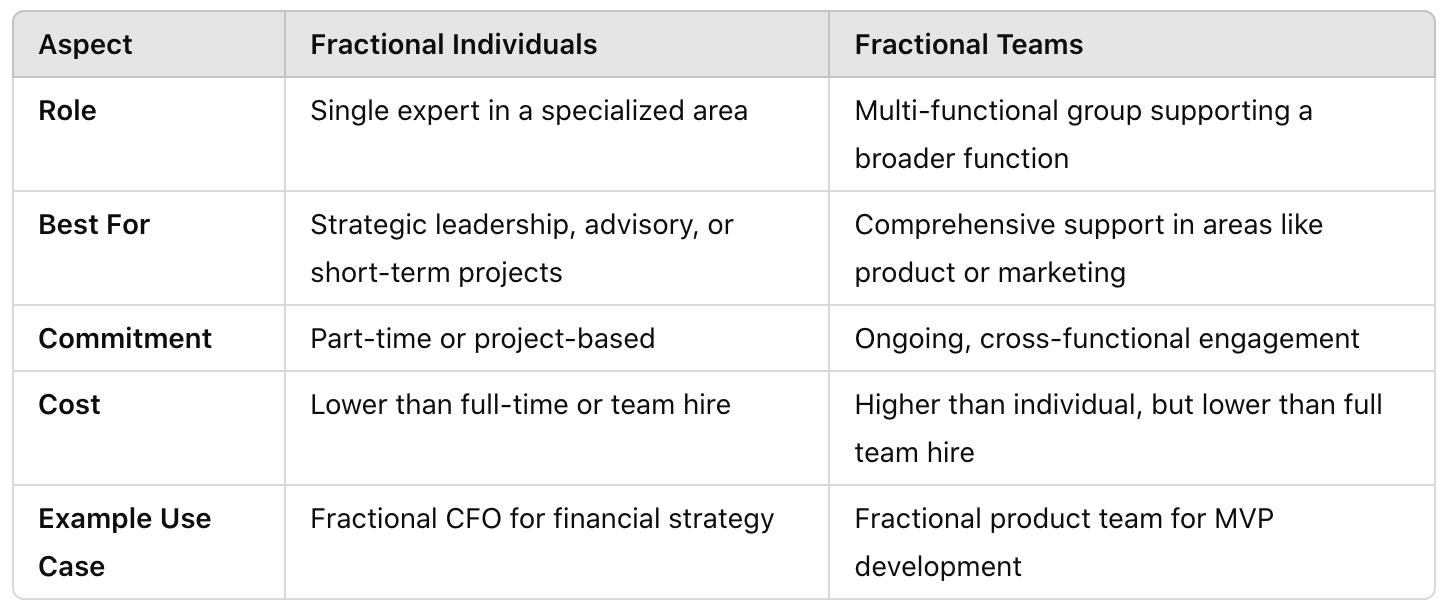Fractional Teams versus Fractional Individuals: Which One Should You Use and Why.
In today’s startup world, founders need flexibility and expertise without the full-time commitment and costs of employees. The rise of fractional teams and fractional individuals has been brought about by this need, both of which provide the on-demand talent particular to your business. However, knowing when to use a fractional team versus a fractional individual can make all the difference to drive effective growth.
The right kind of “fractional” help can go a long way, whether it is scaling product development or improving customer-success.
This guide addresses the differences between fractional teams versus individuals, the unique benefits of each, and when to use one versus the other.
What are fractional teams and fractional individuals?
Let us clarify what fractional teams and fractional individuals are before we get to when to use each.
Fractional Individuals are experts who work on a part-time basis to offer their expertise. Examples include a part-time chief technology officer, chief marketing officer, or data scientist. When you need a high level of competence for a particular position without wanting to hire someone full-time, fractional specialists are a perfect option.
Fractional Teams are groups of professionals working together to support a larger function. Example: Product development team, marketing team, customer success team, etc. Fractional teams give you a wide range of skills all in one team. That means, you do not have to hire multiple full-time employees.
Imagine you’re building a brand-new platform. You can hire a fractional CTO to get things started in case you need technical expertise. If you require other designers, backend developers and QA testers, then a fractional product development team is a better choice.
When should you hire a fractional individual?
A fractional person is best for specialist roles and roles requiring strategic oversight for all or part of their time. Here are a few scenarios where employing a fractional person can prove to be very effective.
- Strategic leadership needs.
- Early-stage startups often require high-level expertise but don’t have the budget for an executive.
- Specific Expertise for Short-Term Projects
- If you need a specific skill set for a short-term project—like data analysis, marketing strategy, or branding—a fractional individual can provide this expertise on a project-by-project basis.
- Advisory Roles for Strategic Decision-Making
- Fractional advisors are invaluable when you need occasional guidance but don’t require hands-on execution. Many founders bring in a fractional CTO or CMO as an advisor, helping them make critical decisions during product development or go-to-market planning.
A fractional CMO or the fractional CFO is a shared resource who does not join the company permanently. A fractional team is an ideal choice when your startup needs ongoing support across multiple roles within a specific function—without the cost or commitment of full-time hires. This setup provides hands-on execution across areas like product development, marketing, or customer support, allowing startups to scale with flexibility.
For tech startups, a fractional product development team brings together developers, designers, and QA specialists, delivering end-to-end expertise that aligns with your roadmap. This approach is particularly beneficial for early-stage SaaS companies looking to launch quickly.
We guide non-tech founders in transforming MVPs into market-ready products, continuously iterating based on user feedback. If your marketing efforts require more than just strategy, a fractional marketing team can handle everything from content creation to social media and digital ads—without the need for a full-time in-house team.
For SaaS or service-based businesses, a fractional customer success team can manage the full customer journey, from onboarding to ongoing support. This setup boosts customer retention and satisfaction affordably, ensuring clients are onboarded effectively, regularly engaged, and fully supported—without the expense of building an entire in-house team.

Choosing Between Fractional Teams and Fractional Individuals
When deciding between a fractional team and a fractional individual, consider the scope and complexity of your needs:
- Choose a Fractional Individual if you need high-level expertise, strategic guidance, or specialized knowledge on a part-time basis. This is ideal for specific, high-impact roles where the need is clear but doesn’t require multiple team members.
- Choose a Fractional Team if you need a more comprehensive, hands-on approach across multiple roles. This is ideal for situations where you require end-to-end support, such as product development, marketing execution, or customer success
Empowering Growth with the Right Fractional Setup
The decision between hiring a fractional individual or a fractional team ultimately depends on the specific needs of your startup. For non-tech founders, fractional resources provide a way to access specialized skills without the burden of full-time hires, allowing you to stay nimble and focused on growth.
At Nolte, we help founders assess their talent needs and identify the best fractional solution for their stage and goals. Whether you need the strategic guidance of a fractional individual or the hands-on support of a fractional team, our approach ensures you have the right mix of expertise to move your business forward.
